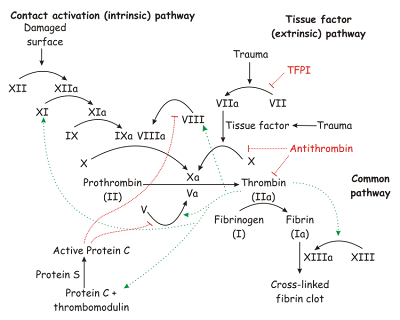Reviewer: S. Randhawa, M.D., Assistant Professor at NSU
A 32-year-old Caucasian female was seen in the clinic for evaluation of an episode of uvular and peritonsillar edema which resolved within 12 hours of taking 40 mg of prednisone previously prescribed by her primary care physician. She has a long history of angioedema since the age of 11 with temporary improvement during pregnancy, but without full resolution of her symptoms. Her mother and her uncle also have symptoms of angiodema history.
Past medical history
Angioedema.
Medications
Prednisone 20 mg po daily and Zyrtec 10 mg po bid.
The physical examination is unremarkable.
The previous laboratory tests included CBC with differential, CMP, sedimentation rate, ANA, rheumatoid factor, TSH, and thyroid antibodies, as well as previous evaluation of the complement components, and there were no significant abnormalities.
What is the most likely diagnosis?
Hereditary angioedema is suspected since similar symptoms have occurred in other members of her family. We suspect that the patient might have type 3 hereditary angioedema.
What would you recommend as next step?
She was advised to taper the prednisone dose to 15 mg po daily for 2 weeks and then to continue prednisone 10 mg po daily for another 2 weeks.
While staying on the maintenance dose of prednisone 10 mg po daily, she was advised to start Celebrex 200 mg po daily and to make a follow up appointment in 4 weeks. Celebrex controlled symptoms in a family member (uncle) who also has angioedema.
If at the 8 week follow up, the patient had no improvement with Celebrex, then we will consider starting progesterone to control her symptoms.
Diagnosis
Hereditary angioedema type III. There is unfortunately no test for "type III" angioedema (source: AAAAI Ask the Expert). Currently, the only place in the U.S. where they ahve performed a test for “type 3 angioedema” is National Jewish Complement Lab http://buff.ly/VkoOxb
The contact information is:
National Jewish Complement Laboratory
Director: Patricia C. Giclas, PhD
Assistant Director: Ashley Frazer-Abel, PhD
Laboratory: 303.398.1541
What did we learn from this case?
Hereditary angioedema type III is typically described in women but can occur in men as well. Certain patients have symptomatic improvement during pregnancy and for them a trial of progesterone therapy may be worth a consideration. Please have in mind that progesterone will stop the menstruation in the such female patients.
Factor XII (Hageman factor)
Hereditary angioedema type III occurs in people with normal C1 inhibitor activity. In some families, mutations in the coagulation factor XII (Hageman factor) gene were detected in the affected persons. Factor XII is encoded by the F12 gene located on the tip of the long arm of the fifth chromosome. Two missense mutations have been identified in F12, the gene encoding human coagulation factor XII. These mutations are thought to be the cause of HAE type III.
Hageman factor was first discovered in 1955 when a routine preoperative blood sample of the 37-year-old railroad brakeman John Hageman was found to have prolonged clotting time in test tubes, even though he had no hemorrhagic symptoms. Hageman was then examined by Dr. Oscar Ratnoff who found that Mr. Hageman lacked a previously unidentified clotting factor. Dr. Ratnoff later found that the Hageman factor deficiency is an autosomal recessive disorder. Paradoxically, pulmonary embolism contributed to Hageman's death after an occupational accident. Since then, case series clinical studies have identified an association of thrombosis and Factor XII deficiency, though the pathophysiology of the relationship is unclear.

The coagulation cascade. Image source: Wikipedia, GNU Free Documentation License.
A 29 year old female has had 5 episodes of lip and tongue swelling and abdominal pain. C4 level, C1-INH level and C1-INH functional level are all normal. Which one of the following should be checked next?
(A) CBC
(B) Factor III
(C) Factor X
(D) Factor VII
(E) Factor XII
(F) Factor II
Answer: E, Factor XII
References
Angioedema, Hereditary. eMedicine Specialties > Dermatology > Allergy & Immunology.
http://emedicine.medscape.com/article/1048994-overview
Angioedema. eMedicine Specialties > Allergy and Immunology > Urticaria and Angioedema.
http://emedicine.medscape.com/article/135208-overview
Hereditary angioedema with normal C1 inhibition. Current Allergy and Asthma Reports, Volume 9, Number 4 / July, 2009.
Ratnoff OD, Margolius A (1955). Hageman trait: an asymptomatic disorder of blood coagulation. Trans. Assoc. Am. Physicians 68: 149–54. PMID 13299324.
Published: 02/23/2010
Updated: 11/23/2012
2 comments:
I also am 31 years old I was diagnosed with idiopathic angioedema 6 years ago. Prednisone even in the highest dose of 60 mg has not helped. I have tried dapsone,every kind of antihistamine,plaquenil,medrol,Ventolin,zyflo,Zaditen there are more drugs I cannot remember all. I have had no relief. My swelling is painful and chronic I swell more than twice a week. My swelling envolves no hives. I have swelling of my lips,tongue,throat,genitals,feet,toes,hands,fingers,scalp,ears and eyelids. I have constant sore muscles,diarrhea,painful stomach cramps and now I am vomitting. My allergist believes strongly that I have type 3 angioedema. I have also seen Dr. Beltrani and I am currently seeing Dr. Luz Fonaciar. Please I beg of you if you have any kind of input please contact me via email crazy4zoe@yahoo.com. I am desperate and in constant pain.
Have you contacted the HAEA? http://www.haea.org/
They provide names of doctors, resoucres and such for people with HAE types 1+2 as well as type 3.
Post a Comment